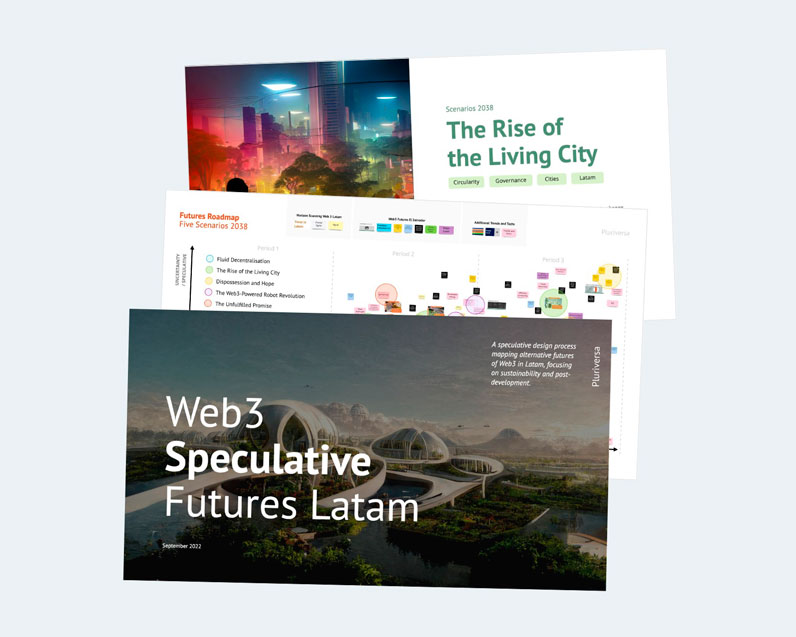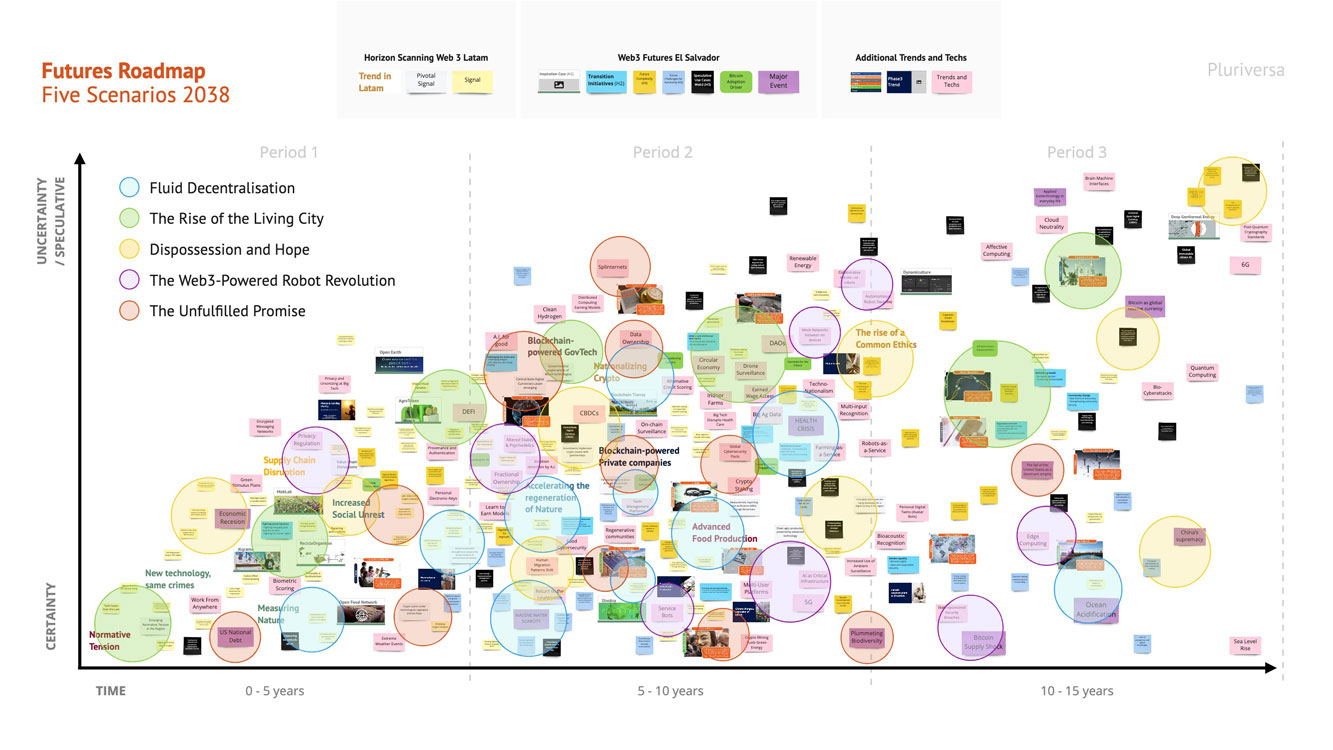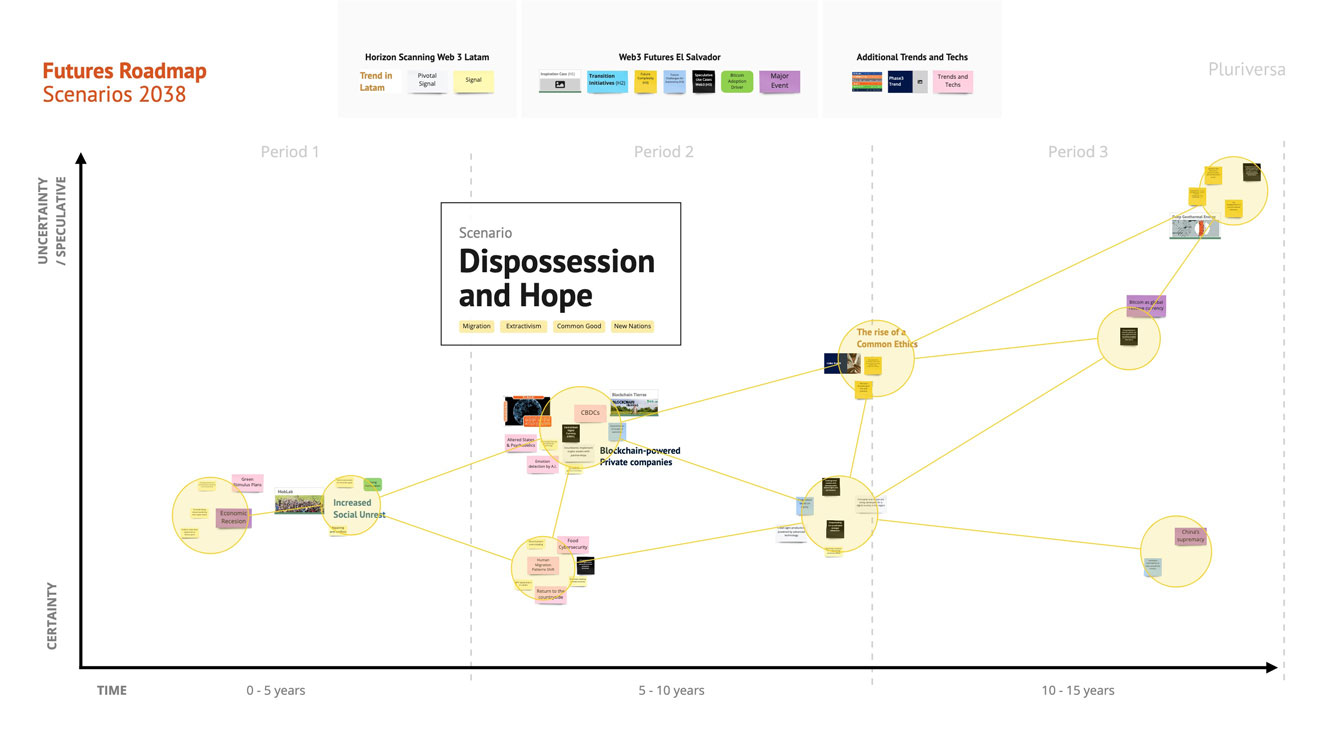Our scenarios
Dispossession and Hope - 2038
Scenario overview
Latin America is experiencing an unprecedented massive migration due to extreme temperatures and the deterioration of the quality of life. People are desperate and armed groups are taking advantage of the region’s vulnerability to send large groups via the Pacific ocean to pursue the ‘Asian Dream.’ The world is under Asian dominance after the crisis of capitalism, and Latin America is experimenting with decentralized forms of governance to confront the situation. Despite the struggles, new solutions using Web3 technologies are emerging, and a new form of regional identity is taking shape.
*This scenario was created originally in British English.
-
Web3 Speculative Futures Latam
Sector:
Web3, Bitcoin, Blockchain
Key topics:
Migration, Extractivism, Common good, New Nations
Time horizon:
2038
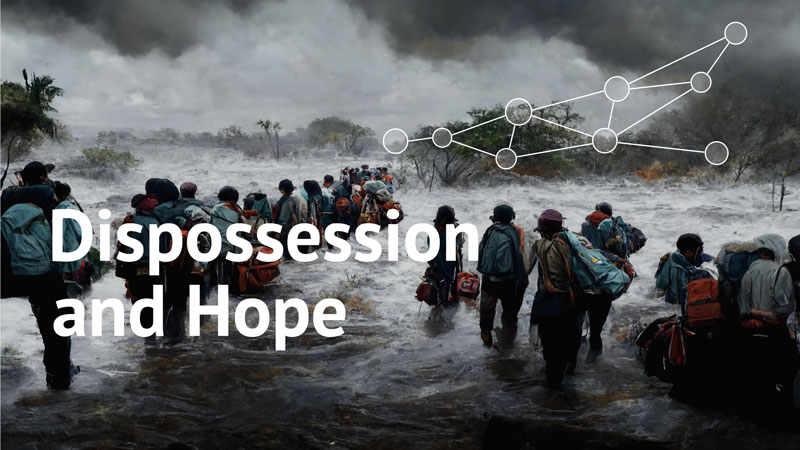
Centralizing myopia
As the different scientific committees predicted more than two decades ago, high temperatures and precarious living conditions generated a migratory crisis that pushed many communities to the south. Some search for cooler climates; others head to the Amazon and mountainous areas to guarantee their access to water resources; Unfortunately, in both cases, international conflicts are inevitable.
The “Great Reboot” proposed by global elites failed, and most population no longer believed in plans for global salvation under the myopia of centralization. After a decade, the famous project was just another example of inequality, keeping the same privileges and guaranteeing them access to scarce natural resources.
In the face of a crisis of this magnitude, governments and state services collapsed, and it was imperative to decentralize social and health assistance, regional protection, and state governance. Now Latin America has begun dismantling most of its old nation-states, making evident the obsolescence of the United Nations. Many are clamoring for a more comprehensive transition process, but unfortunately, the incremental scale of natural disasters cannot wait.
Under the grip of climate change and the unprecedented social crisis, Latin America experienced the most intense migratory flows and violence in recent history.
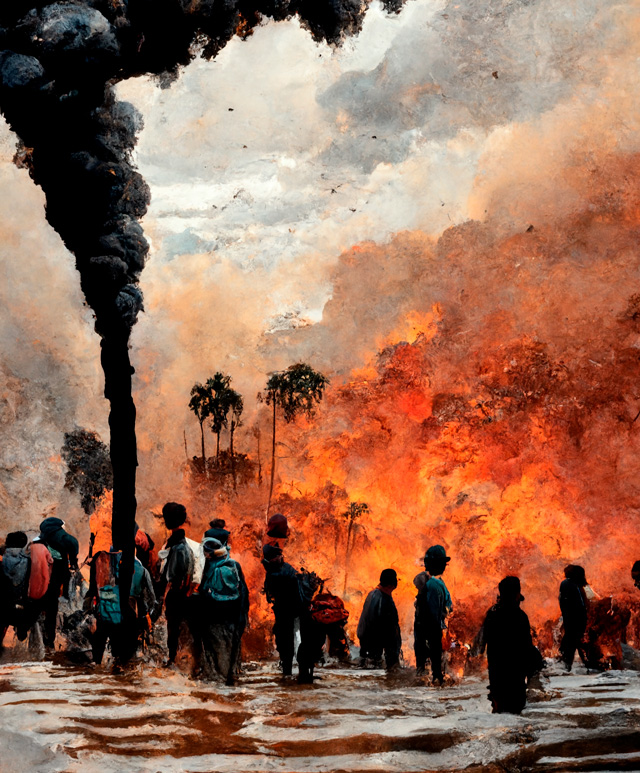
The Asian silk dream
The situation for many is desperate. Illegal groups are taking advantage of the region’s vulnerability to move migrants across the Pacific Ocean to Asia’s economic promise.
Thousands of Latin American families embark on this challenging journey for a better future, but racism and human rights violations against unprotected migrants are not uncommon. Their priority is to transfer to their relatives in Latin America some digital money issued by the local central bank. Even though they fear that due to their illegal status, the government will confiscate their savings at the click of a button, block capital flows to their home regions at any time, or cut off their access to essential services.
Fortunately, the immutable identities of the Web3 allow families to keep track of the health, economic and general status of their loved ones abroad, significantly reducing cases of neo-slavery and human trafficking.
Unprotected natural resources
The world is under Asian global supremacy, and Latin America has no centralised state or coordinated armed forces; Pacific coastal communities suffer from continuous illegal incursions by Asian fishing drones, leaving fish and shark species on the brink of collapse.
Amid the crisis of global capitalism, Latin American paramilitary groups ally with Asian extractivist interests, receiving crypto-financing and advanced weaponry, instilling terror in some resource-rich areas to steal the land, deepening the migration crisis.
Asian military power keeps a watchful eye on Latin America’s social, economic, environmental and technological environment, making it almost impossible to respond to these extractivist threats. Given this outlook, there is genuine concern about an invasion to steal the rich deposits of lithium, silicon and other strategic minerals for technological production.
The birth of a decentralised Latin America
Latin America is dismantling the failed states and old political borders. The continuing suffering of the migrant population and severe geopolitical risks enabled the emergence of a new Latin American consciousness of common goods and continental cooperation framed by bioregions, their protective communities, and the energetic structures that compose them.
These bioregions are community epicenters with national statuses, such as the Amazonian Lung nation, the Orinoco Valley nation, the Central Volcanic nation, the Peace Forest nation, the Norpatagonia nation, or the Western Sierra Madre nation, to name a few. These emerging states redefine local community identities but align with a new continental vision: the Decentralised Latin American Brotherhood (DLAB).
This is the beginning of a new prototype in Latin America called the Decentralised Society (DeSoc).

A solid foundation
Under a representative democracy, the diverse emerging nations coordinate their efforts in the complex management of the migration, military, and environmental crises. It is essential to minimize counterparty risk in transactions with other nations, which is why Bitcoin is declared the continental reserve currency.
The true catalyst for continental decentralization was the diaspora from the ancient nation of Venezuela. In previous decades, the Venezuelan migrants who flooded Latin America settled in new regions, creating transnational communities that cooperate in a decentralized manner, boosting the flow of people and economies throughout the continent.
If the Venezuelan community laid the foundations for a new decentralized Latin American society, it was thanks to El Salvador’s old learnings the continent understood the importance of having reliable cryptocurrency protocols such as Bitcoin. This perfect cryptocurrency fostered the transition to decentralized clean energy, decentralized financial systems, and decentralized ownership of these two.
An economy for the common good
Thanks to the Bitcoin protocol’s quantitative transparency, the emerging Latin American nations can focus on the qualitative impacts of this new prototype of a Decentralised Society. In this way, outdated indicators such as the Gross Domestic Product (GDP) solely focused on economic production are abolished, giving way to a calculation of systemic qualitative elements of the welfare state of society and the environment.
This new philosophy has also permeated private enterprises where natural resources and labor rights are now a priority, and sexual discrimination or tax evasion is discouraged.
Businesses and nations no longer confuse their “success” with financial profit, now have integrated an immutable Web3-hosted common good balance sheet with qualitative indicators where the “benefit” is to increase the common good. These indicators focus on five key points: human dignity, solidarity, justice, environmental sustainability, and democracy.
A new Artificial Intelligence for the continent’s security, fed with social and environmental data, manages the strategic capital allocation under a decentralized solidarity economy. This Artificial Intelligence anticipates the migratory flows to avoid the collapse of natural systems wherever they arrive and increases the response speed to natural disasters. It also mediates the resolution of conflicts between nations, where, in addition to the agreements reached, the parties make Bitcoin deposits as a sign of trust for future steps forward.
Bitcoin for peace and sustainability
Wars became so cost-prohibitive under the risk of annihilation through systemic food shortages and climate change, making violent groups and drug cartels find competition over the legitimate custodial status of territorial property impractical, thus creating a breeding ground for growing nonconformism among their militants.
A new property model and custodial status are needed, one that allows storing effort (energy) and inhabiting an annihilation-resistant space (cyberspace) to foster society’s cooperation and provide a just method of consensus.
By implementing on the continent a digital-synthetic and cryptographic commodity known as Bitcoin, the entire form of ownership was redefined, restoring the ability of communities (including violent groups) to reach a consensus on their legitimate state of custody and thus “justly” resolve emerging conflicts. Bitcoin not only represented a solution as the perfect property but also became the social consensus protocol that made warfare obsolete by serving as its functional substitute. [1]
Cooperating nations and communities finally understand the relevance of the best “proof of work” to build trust between actors. The nature of climate change forced them to cooperate in new radical ways for efficient response, mitigation, adaptation, and innovation of systemic production and governance, making Web3 the tool to implement direct democracy.
[1] This segment is an adaptation of Jason Lowery‘s amazing work. For more information, read this article.

This cipher-acupuncture (sound decentralized digital money) completely changed civilization and the global social mindset to a low-time preference. It means that now citizens consume less and invest a lot more in their future, creating a new level of well-being and artistic flourishing without precedent.
These changes allowed the old economic, political and technocratic elite to subjugate. Now sobriety and austerity, collective control of energy and labor, and placing limits on expanding production are valued for promoting emerging nations’ autonomy and creativity.
There is still crime and pirates breaking into the best-adapted communities. There are many social, military, and migratory challenges ahead. Still, the continent achieved an unprecedented civilizing evolution, where a new continental identity emerged, and large violent clans and drug cartels disappeared.

